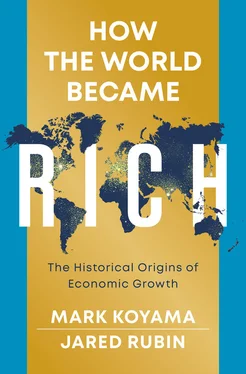1 Cover
2 Dedication Dedication Mark: For Desiree. Jared: To my father, Thom, and the memory of my mother, Linda.
3 Title Page How the World Became Rich The Historical Origins of Economic Growth Mark Koyama Jared Rubin polity
4 Copyright Copyright © Mark Koyama and Jared Rubin 2022 The right of Mark Koyama and Jared Rubin to be identified as Author of this Work has been asserted in accordance with the UK Copyright, Designs and Patents Act 1988. First published in 2022 by Polity Press Polity Press 65 Bridge Street Cambridge CB2 1UR, UK Polity Press 101 Station Landing Suite 300 Medford, MA 02155, USA All rights reserved. Except for the quotation of short passages for the purpose of criticism and review, no part of this publication may be reproduced, stored in a retrieval system or transmitted, in any form or by any means, electronic, mechanical, photocopying, recording or otherwise, without the prior permission of the publisher. ISBN-13: 978-1-5095-4024-2 A catalogue record for this book is available from the British Library. Library of Congress Control Number: 2021944393 The publisher has used its best endeavours to ensure that the URLs for external websites referred to in this book are correct and active at the time of going to press. However, the publisher has no responsibility for the websites and can make no guarantee that a site will remain live or that the content is or will remain appropriate. Every effort has been made to trace all copyright holders, but if any have been overlooked the publisher will be pleased to include any necessary credits in any subsequent reprint or edition. For further information on Polity, visit our website: politybooks.com
5 Preface
6 1 Why, When, and How Did the World Become Rich? What Is Economic Growth? Measuring the Past What Will You Learn from This Book? What This Book Does Not Do
7 Part I Theories of How the World Became Rich 2 Did Some Societies Win the Geography Lottery? Geography and Modern Development Mountains, Coasts, and Climate Geography and Transport Infrastructure Geography and Industrialization Chapter Summary 3 Is It All Just Institutions? What Are Institutions? Property Rights The Legal System Political Institutions More Equal Rights for All Institutions and the Commercial Revolution Between the State and the Market: Guilds Parliaments and Limited Government War and State Finances Chapter Summary 4 Did Culture Make Some Rich and Others Poor?What Is Culture and Why Does It Matter? Can Culture Explain the European Take-off? Does Religion Affect Economic Growth? The Protestant Work Ethic and the “Spirit” of Capitalism If Not a Work Ethic, Why Did Protestant Countries Grow Faster? The Reformation and Religion as a Source of Political Legitimacy Is Islam the Cause of Middle Eastern Economic Stagnation? The Long-Term Persistence of Culture The North–South Italy Divide The Persistence of Trust Norms Gender Norms Chapter Summary 5 Fewer Babies? Malthusian Pressures The Black Death Household Formation and the European Marriage Pattern Did the EMP Spur Economic Growth? Reasons for Skepticism Demographic Change and the Transition to Modern Economic Growth Chapter Summary 6 Was It Just a Matter of Colonization and Exploitation? How Did the Colonizers Benefit? The Slave Trades The Resource Grab Some Silver Linings of Colonialism? Public Goods and Education Missionaries Chapter Summary
8 Part II Why Some Parts of the World Became Rich First, Why Other Parts Followed, and Why Some Are Not There Yet 7 Why Did Northwestern Europe Become Rich First? How Geography Shaped Institutional Development Why Was There No Medieval European Take-off? Divergence within Europe Just before the Take-off Parliaments and the Rise of Limited, Representative Government Chapter Summary 8 Britain’s Industrial Revolution A Consumer Revolution Capitalist Agriculture Do Political Institutions Explain Britain’s Industrialization? Mercantilism and Empire Does the Transatlantic Slave Trade Explain Britain’s Industrialization? Was It Cotton? Was It Market Size? How About State Capacity? Maybe It Was Skilled Mechanical Workers? An Innovative Economy High Wages and Induced Innovation An Enlightened Economy Chapter Summary 9 The Rise of the Modern Economy The Fruits of Industrialization The Second Industrial Revolution The Demographic Transition The Uneven Diffusion of Modern Economic Growth How the US Became Rich The Soviet Detour Chapter Summary 10 Industrialization and the World It Created Delayed Catch-up: The Shadow of Colonization (and Other Factors) How Japan Became Rich How the East Asian Tigers Became Rich How China Is Becoming Rich Chapter Summary 11 The World Is Rich
9 References
10 Index
11 End User License Agreement
1 Chapter 4 Table 4.1Most populous cities in Western Eurasia, 800 CE
2 Chapter 5 Table 5.1Black Death mortality by country
3 Chapter 6 Table 6.1English crop yields, 18th century
4 Chapter 7 Table 7.1British borrowing and interest rates, 1693–1739
5 Chapter 8 Table 8.1Most populous English cities excluding London (with populations of at least 10,0…
6 Chapter 9 Table 9.1Major inventions of the Second Industrial Revolution
1 Chapter 1 Figure 1.1Countries that were richer in 2018 (annual per capita income) than the US in 190… Figure 1.2Countries that were richer in 2018 (annual per capita income) than Great Britain… Figure 1.3People living in extreme poverty, 1820–2015 Figure 1.4Year that per capita GDP exceeded $10 per day (2018 USD) Figure 1.5Yearly per capita income for selected regions, 1 CE–present Figure 1.6US GDP per capita, 1720–2018 (2018 USD) Figure 1.7Ruggedness and income in African and non-African countries Figure 1.8The reversal of fortunes within formerly colonized nations, 1500–1995
2 Chapter 2 Figure 2.1Coastlines of African countries Figure 2.2Africa’s “malaria belt” Figure 2.3Verticality and horizontality of the continents Figure 2.4Technology adoption levels in 1500 (% of frontier technologies adopted) Figure 2.5Temperature deviations across Europe, 1100–1800 Figure 2.6The Roman road network Figure 2.7The increase in turnpikes in England and Wales: 1680–1830 Figure 2.8Changes in US market access, 1870–90 Figure 2.9Location of cities in England and France in the Roman and medieval periods Figure 2.10The price of energy in the early 1700s
3 Chapter 3 Figure 3.1Rule of law vs. per capita GDP Figure 3.2Night lights on the Korean Peninsula Figure 3.3Rule of law index, 2017 Figure 3.4The first(?) formal legal system: the Code of Hammurabi Figure 3.5Legal origins throughout the world Figure 3.6Polity score, 2017 Figure 3.7Democracy score, 2017 Figure 3.8Parliamentary activity in Europe, 1100–1800 Figure 3.9Tax revenues per capita for six European powers, 1500–1900 Figure 3.10Interest rates in city-states and territorial states, 1200–1800
4 Chapter 4 Figure 4.1Subcultures of the US Figure 4.2Percentage Protestant, Catholic, and Muslim vs. per capita GDP Figure 4.3Percentage of Protestants vs. school enrollment rate in early 19th-century Pruss… Figure 4.4Ruler duration in Western Europe and the Islamic world Figure 4.5The north–south Italy divide: cousin marriage, trust, and judicial efficiency Figure 4.6The relationship between trust and per capita GDP Figure 4.7Traditional plow use, female labor force participation, and female firm ownershi…
Читать дальше












